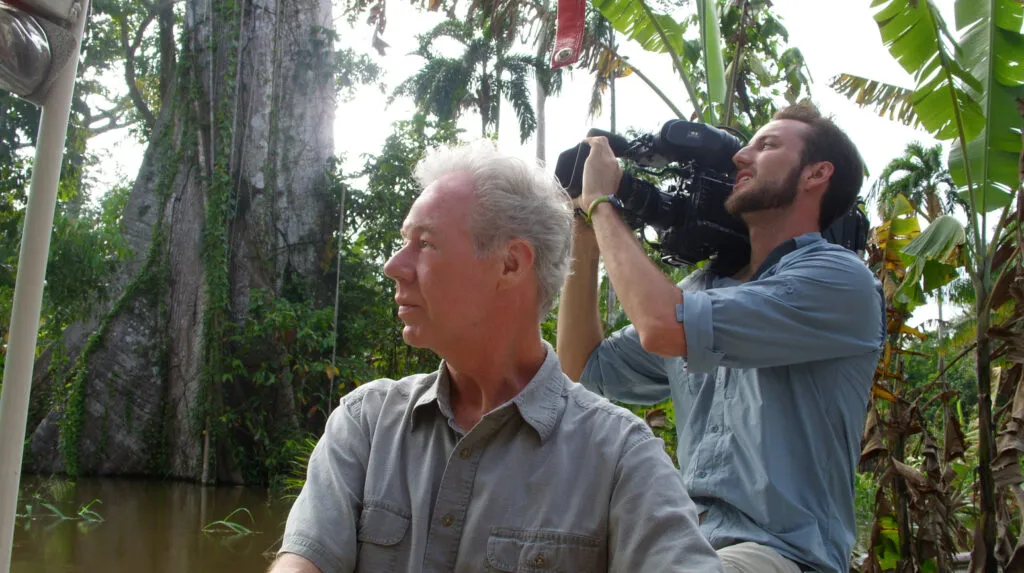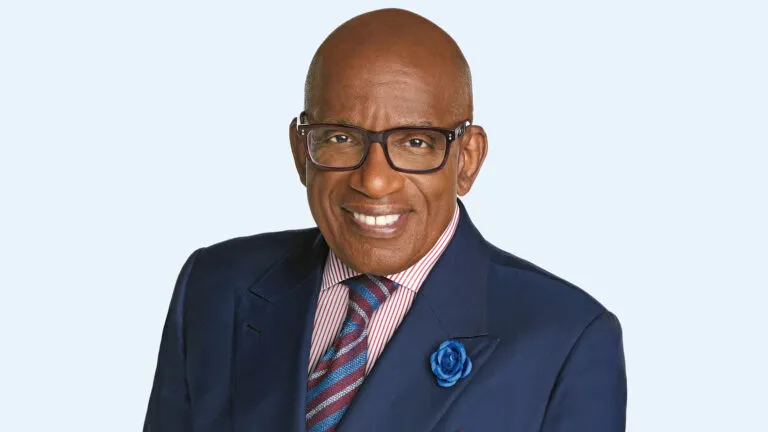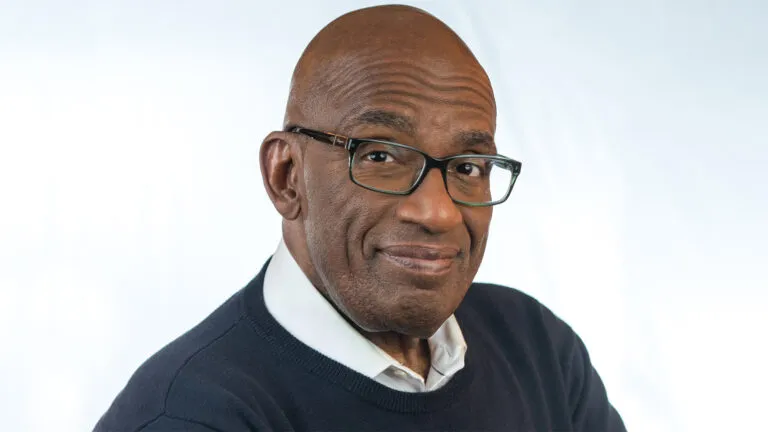Martin Doblmeier is an award-winning documentary filmmaker and the founder of Journey Films, a production company that focuses on stories of religion, faith and spirituality. He has produced more than 30 films that have aired on PBS, ABC, NBC, and the BBC.
One of his most prominent documentary series is Prophetic Voices. It tells the stories of five prominent spiritual leaders in history: Dietrich Bonhoeffer, a German pastor and anti-Nazi dissident; Reinhold Niebuhr, a theologian and political commentator; Howard Thurman, a Civil Rights leader who was a spiritual mentor to Dr. Martin Luther King, Jr; Dorothy Day, a Catholic activist who fought for worker’s rights; and Abraham Joshua Heschel, a rabbi who escaped the Holocaust and fought for world peace. The series includes interviews with their friends and family, spiritual leaders, philosophers, and activists such as Desmond Tutu, Cornel West, and Martin Sheen.
Doblmeier, who also narrates the series, sought to tell their stories, from the pasts that shaped them to the future they shaped for all of us. He talked with Guideposts.org about why he wanted to share these powerful voices, why we should still listen to them today, and what it means to be a prophetic voice.
GP: Why did you start Journey Films?
When I was in my mid-20’s I worked in commercial television. It was a great learning experience, but there was virtually no space for bold stories about religion at work in people’s lives. That’s why I felt compelled to start Journey Films, to offer a perspective of faith that was not being recognized. Journey Films tells the stories of people—past and present—living dramatic lives in their own search for God; and from that search, impacting the world in remarkable ways.
GP: As a documentarian, why did you choose to focus on stories of faith and spirituality?
My family instilled in me a genuine love of God, an appreciation for faith and a concern for the welfare of others. Looking back, I see now that it became foundational for me. In college, I got my degrees in religious studies and broadcast journalism. After nearly four decades in these fields, I saw my contribution to the world could be telling very human stories and doing it through film. And the stories I want to share most are stories about how people respond to the presence of God and the divine in their lives.
GP: What made you want to do a documentary series about prophetic voices?
I felt drawn to tell the stories of figures who left a mark on the 20th century. Many of these figures lived a life of faith yet were not widely known to the American public. I wanted to change that.
I also saw a chance to address timeless theological questions not just as theory, but ideas actually lived out. We can raise profound ideas of faith through the real lives of these figures. For example, Rabbi Abraham Heschel talks about us being “partners with God” in the very transformation of the world. But what does that really mean? Then we see Heschel standing on the front lines of a protest with Dr. Martin Luther King, Jr., trying to gain basic civil rights for Black people in America. When you see them marching arm in arm, the notion of partners in God’s work comes to life.
GP: What made you choose to focus on these five figures?
I have read and long admired each of these people. Dietrich Bonhoeffer was the young German theologian who joined the plots to kill Adolf Hitler and ultimately gave his life for the cause. Reinhold Niebuhr is probably best remembered as the author of the famous Serenity Prayer, but in his day, he was the most important public theologian in America. Howard Thurman was the grandson of enslaved people who became the unofficial pastor of the Civil Rights Movement and a spiritual mentor to Dr. Martin Luther King, Jr. Dorothy Day was a great Catholic social justice champion who started homes for the poor during the Great Depression. Abraham Joshua Heschel narrowly escaped the Holocaust and came to America to become one of the most important philosophers of the 20th century.
Being permitted to tell their stories was in its own way a sacred trust. The family and community around each of these figures invited me in and trusted me with their stories. I was humbled by their confidence.
READ MORE: The Divine Encounters of Howard Thurman, Civil Rights Pioneer
GP: Why do you think it is important to show the human side of these figures along with the divine side?
All five figures in our Prophetic Voices series were remarkable, but none of them would call themselves “saints.” A saint is someone we too often put up on a pedestal. These prophetic voices knew that to create genuine change, they needed to be in our midst. So, in the telling of their story, I wanted to let viewers know these five figures were ‘saint-like’—but they were also very human.
For example, we admire Dietrich Bonhoeffer for his courage to stand up to the rise of Hitler but to explore his life more deeply is to realize his was not a straight path. He had moments of genuine doubt and fear, just as we all do. But what we admire about him is that he was always asking himself what God was calling him to do in that moment. His was in a constant process of discernment, a search for the will of God and that is something to admire.
READ MORE: 7 Inspiring Quotes from Dietrich Bonhoeffer
GP: Why do you feel it is still important to study and listen to spiritual leaders during uncertain times?
Each of these Prophetic Voices experienced a great deal of loneliness and separation from members of their traditions for their actions. They each suffered professionally and, on occasions, even personally. Yet that would not dissuade them from stepping out courageously to address great injustices. Their faith opened their eyes and called out the very best in them. As a result, it became impossible for them to ignore the social and political injustices of their day. That is why today, a half century later, we continue to celebrate their courage.
GP: Why do you feel the subjects of these documentaries are still timely?
The sad reality is that so many of the issues they confronted in their day still remain—racial injustice, economic imbalance, military standoffs and the ever-present nuclear threat. We can turn to them again because, in attempting to address the great political and social issues of their day, they drew on historic realities, Biblical truths, the lives of the saints, and proven philosophical wisdom to show a path forward.
GP: After making these films, what do you think it means to be a prophetic voice?
To be a prophetic voice does not mean that these were people who could see into the future. They were not prognosticators or fortunetellers. These were five remarkable figures who were willing to sacrifice their own personal and professional security to speak truth to power. They were grounded in their own faith traditions and in them was a desire to confront the great social and political injustices in their day.
GP: What did this series teach you about how we open ourselves up to God’s Word?
As people of faith, we firmly believe God continues to speak to us today. However discerning what is being spoken isn’t always easy or completely clear.
Yet in the case of these prophetic voices, we see five people who represent the very best of what is possible when human beings remain committed to the search for the will of God. Not only do they benefit, but we also benefit from their continued search and willingness to stay the course. As people of faith, we are all called to be prophetic voices in our places of work, our communities and even in our families.
GP: What do you hope audiences will take away from these films?
I hope it invites people not just to admire these figures from a distance, but to call themselves into account for how so many of us take the easy, safe path when it comes to calling out injustice. We have the power in our own way, if not to change the world, to at least change the world around us. And in doing that we become prophetic voices.
The Prophetic Voices series is now available through Journey Films.
This interview has been lightly edited for clarity and length.






